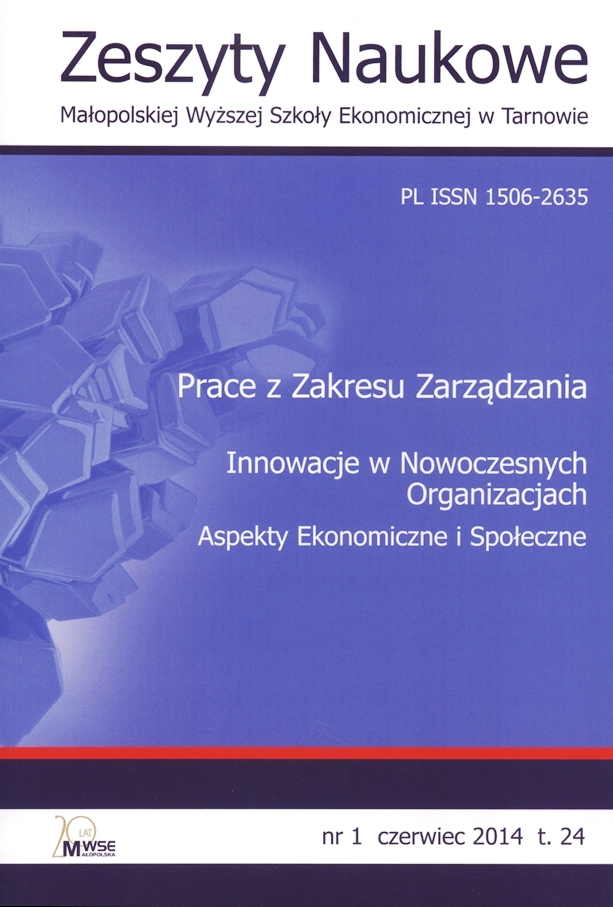Abstract
The future development of the economy, its modernity and innovation are cooperation businesses. The degree of cooperation is dependent on the environment, competitors, and the needs of the cooperator. Every company that operates in terms of the knowledge economy to be developed and strengthened their position in the market, must be innovative (i.e. must have and build the necessary capacity, used to create innovation), and that is possible due to acquisition of knowledge from external sources, called: knowledge alliances. The practice indicates growing number of cooperation initiatives of enterprises with external entities in the field of collaborative learning. Alliance helps in the exchange of experiences and knowledge between cooperating organizations. The first part of the article outlines the theoretical recognition of such alliances, the second part contains the results of studies that demonstrate the use of this form of knowledge acquisition by the company of Tarnow and Malopolska region. The purpose of this article is to present modern forms of knowledge from outside. It was also an attempt to identify the determinants of cooperation at the level of cooperation with external institutions and evaluate their effectiveness, as a condition for strengthening the capacity development of the company. The level of cooperation of enterprises in the alliance knowledge has been additionally evaluated.
References
Altkorn, J. (2002). Kształtowanie rynkowego wizerunku firmy. Kraków: Wydawnictwo Akademii Ekonomicznej w Krakowie. ISBN 83-7252-119-0.
View in Google Scholar
Aluchna, M. (2006). Formułowanie strategii „blue ocean” [online, dostęp: 2014-02-24]. Dostępny w Internecie: http://www.e-ureka.net/wp-content/uploads/2010/08/Formulowanie_strategii_blue_ocean.pdf.
View in Google Scholar
Danik, L., Żukowska, J. (2011). Czynniki wpływające na sukces kooperacji polskich przedsiębiorstw w innowacjach (w przekroju branżowym). Prace Naukowe Uniwersytetu Ekonomicznego we Wrocławiu. Problemy regionalizmu i globalizacji, 221, 123‒136.
View in Google Scholar
Firszt, D. (2012). Uwarunkowania dyfuzji innowacji w polskiej gospodarce. Warszawa: CeDeWu. ISBN 978-83-7556-515-7.
View in Google Scholar
Markiewicz, J. (2007). Wpływ instytucji wsparcia na rozwój kooperencji i innowacyjności przedsiębiorstw w województwie zachodniopomorskim. Zeszyty Naukowe Uniwersytetu Szczecińskiego, 453 [online, dostęp: 2014-02-24]. Dostępny w Internecie: http://www.wzieu.pl/zn/453/summ/14_markiewicz.pdf.
View in Google Scholar
Pomykalski, A. (2011). Model otwartej innowacji a zarządzanie sieciowe organizacją. W: J. Rybicki, T. Drul (red.). Strategie sukcesu organizacji (s. 139‒148). Sopot: Wydział Zarządzania Uniwersytetu Gdańskiego. Fundacja Rozwoju Uniwersytetu.
View in Google Scholar
Sikorski, Cz. (1999). Zachowania ludzi w organizacji. Warszawa: Wydawnictwo Naukowe PWN. ISBN 83-01-12915-8.
View in Google Scholar
Wawryszuk-Misztal, A. (2007). Strategie zarządzania kapitałem obrotowym netto w przedsiębiorstwach. Lublin: Wydawnictwo UMCS. ISBN 978-83-227-2742-3.
View in Google Scholar
Wiśniewska, J. (2010). Procesy transferu technologii w bankach komercyjnych w Polsce. Szczecin: Wydawnictwo Naukowe Uniwersytetu Szczecińskiego. ISBN 978-83-7241-772-5.
View in Google Scholar
Wojtowicz, A., Kozioł, L. (2012). Koncepcja aliansów wiedzy w procesie innowacji. Zeszyty Naukowe Małopolskiej Wyższej Szkoły Ekonomicznej w Tarnowie, 1, 211‒223.
View in Google Scholar
Żołnierski, A. (2005). Potencjał innowacyjny polskich małych i średniej wielkości przedsiębiorstw. Warszawa: Polska Agencja Rozwoju Przedsiębiorczości. ISBN 83-60009-07-4.
View in Google Scholar
© Copyright by Małopolska School of Economics in Tarnów. The articles are available under the Creative Commons Attribution NonCommercial-NoDerivatives 4.0 International License


